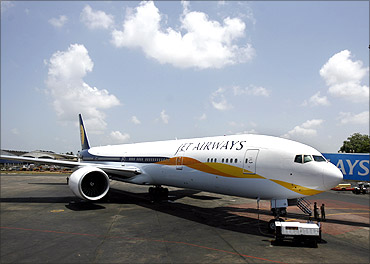
Indian Oil Corporation (IOC) on Thursday fought back on the allegation by airlines that company is usurping gains from the reduction in crude oil prices by not passing on the lower costs.
Four airlines that account for 95 per cent of the aviation traffic volumes, had alleged that IOC had been profiteering through its “ambiguous pricing mechanism” by pocketing the gains.
Refuting all the allegations, IOC has clarified that no monopolistic situation exists in supply and pricing of aviation turbine fuel (ATF) to airlines.
“With the open access system already in place in major airports, covering 40 per cent of total volumes, which is expected to further increase to 60 per cent in the near future, fair competition already exists in ATF supplies and pricing,” IOC said in an emailed response toBusiness Standard.
The oil marketing company (OMC) said airlines negotiate their prices and supply with oil firms, and this negotiated price was lower than the price of imported fuel.
“In addition, airlines have the option to import the product for their own use. Considering the fact India imports more than 80 per cent of its crude oil requirement, it is inappropriate to compare the prices of ATF in an oil importing country with that in an oil exporting country,” IOC said.
In a letter written on behalf of the Federation of Indian Airlines (FIA) earlier this month, airline promoters Nusli Wadia (GoAir), Naresh Goyal (Jet Airways), Ajay Singh (Spice Jet) and Rahul Bhatia (IndiGo) had argued ATF was subject to a multiplicity of taxes in India, leading to the domestic carriers paying up to 50 per cent more for fuel than in Dubai or Singapore.
IOC said while the Free on Board (FOB) price of ATF has decreased by 65 per cent, state taxes and levies have decreased by only 38 per cent.
“Consequently, although freight and other costs have virtually remained constant, the final selling prices have fallen by only 51 per cent,” the firm said.
It added the selling prices, even prior to the fixed level of discounts, have halved from Rs 71,800 per Kilo liter in April 2014 to Rs 35,100 per Kilo liter in February 2016.
So, the full benefit of around Rs 36,700 per Kilo liter has been passed on to the Airlines.
“In this context, it would be pertinent to examine whether the fares charged by the airlines have also commensurately reduced,” IOC said.
The retailer also called as “factually incorrect” the airlines contention that the oil prices in March 2016 have fallen by 22 per cent as compared to February 2016. It said the average FOB price for ATF for March 2016 has gone up by over 9 per cent as compared to February 2016.
As a result, considering the 6 per cent increase in excise duty with effect from 1 March 2016, around 49.6 per cent of the price increase is was on account of excise duty while the rest 50.4 per cent (around Rs 2,100 per Kilo liter) was on account of increase in global prices and the deterioration in exchange rate.
Protesting against the 12 per cent increase in ATF prices announced by OMCs beginning 1 March, the airlines had argued the net reduction of 16 per cent in ATF prices in March 2016 has not been passed on to the airlines.
[Source:- Rediff]
